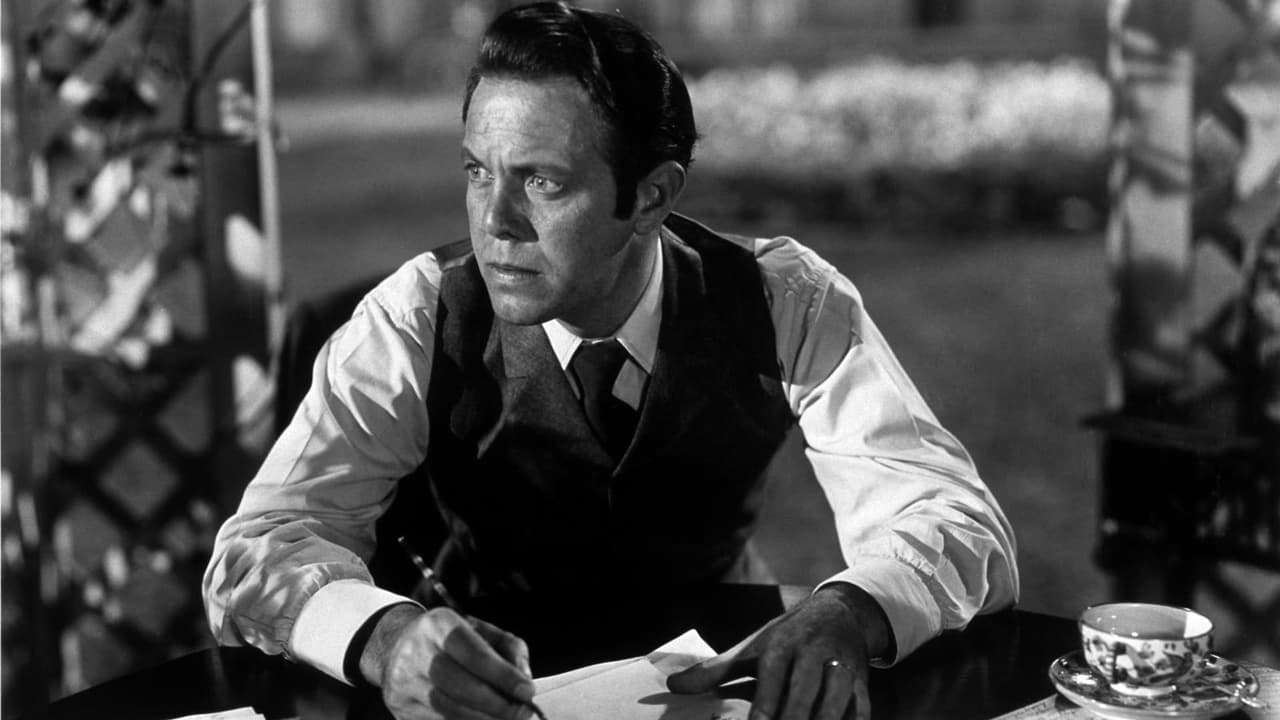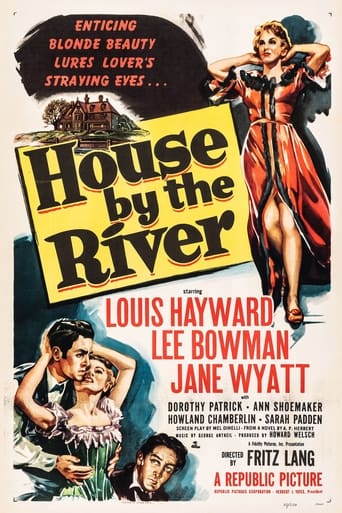

I enjoyed this thriller about a psychopathic writer who accidentally kills his sexy maid and then tries to pin it on his crippled brother.Louis Hayward overacts a bit as Stephen, the failed scribe who rejects his attractive and classy wife, Marjorie (Jane Wyatt), in favor of his tease of a housekeeper.I enjoyed the performance of Lee Bowman as Stephen's brother John, who, out of family loyalty, allows himself to be dangerously manipulated. He too harbors a forbidden love -- for his brother's wife -- but has the integrity not to act on it. Descending into alcoholism, he'd rather flee than make love with his sister-in-law.In a film that is much less ambitious than a classic such as "M," Fritz Lang creates scenes of satisfying creepiness on a river that is central to the plot. In addition, a courtroom scene is quite entertaining.My only quibble with this movie is its facile ending. It all ties up just a little too neatly. I expected more from this famed director.
... View MoreFritz Lang directs this suspenseful Fidelity Pictures drama. Stephen Byrne(Louis Hayward)is a somewhat depressed writer due to a rash of rejection notices. While his wife Marjorie(Jane Wyatt)is away for the day, Stephen makes advances toward the pretty newly hired maid Emily(Dorothy Patrick)and when she tries to fight him off he kills her. The rattled writer, with the help of his brother John(Lee Bowman), manages to stuff Emily in a bag and dumps her body in the river. Byrne gets the inspiration he has seemed to be lacking of late and will start writing a book about the disappearance of the servant and also attempt to frame his brother for the murder. Very good sets and atmosphere. As Stephen goes out on the river and starts coming unhinged you can almost feel his desperation. Hayward and Bowman are the only actors that gets a chance to show their talent. Miss Wyatt is certainly attractive with little effort. Other players: Ann Shoemaker, Kathleen Freeman, Will Wright and Howland Chamberlain.
... View MoreHouse by the River is directed by Fritz Lang and adapted by Mel Dinelli from A.P. Herbert's novel The House on the River. It stars Louis Hayward, Jane Wyatt, Lee Bowman & Dorothy Patrick. Music is by George Antheil and photography by Edward J. Cronjager.Novelist Stephen Byrne (Hayward) makes a play for the house maid and unwittingly kills her when she repels his advances. Enlisting the help of his disabled brother, John (Bowman), to dispose of the body in the river, Stephen suddenly finds that the publicity surrounding the maid's disappearance has put him in vogue again. In fact he finds his muse sufficiently stoked enough to craft another novel. But as easy as Stephen finds it easy to have no conscience, the opposite is the case with John, and with the river refusing to hold its secrets, something is going to give.Working out of Republic pictures, Lang refused to let the low budget production hamper his vision of a bleak Cain & Abel like Gothic-noir-melodrama. He did, however, meet some resistance when requesting that the maid be played by a black woman, which was quickly shot down by nervous executives at the famed "B" movie studio. House by the River is far from being among the best of Lang's work, but the final product is still a triumph considering it's basically a three character piece set virtually in just two locations. It scores high on eerie atmosphere and finds Lang dealing in moral bankruptcy/responsibility and the eye for an eye mentality. Ushered into the narrative, too, is a Lang fave of people irked by loving someone they can't have. These themes allow the director to gloss over the simple script and dally in some truly arresting visuals.Aided considerably by Cronjager's (Desert Fury/CanyonPassage) chiaroscuro photography, Lang's film is a lesson in how to maximise effect from limited sets. The actual house on the river, and that of the neighbour (resplendent with creepy scarecrow in garden), has a very disquiet feel to it, fronted by shimmering water that carries the dead carcass' of animals, it's a most haunting setting. And the eerie atmosphere continues inside the house, where shadows work their wonders and Antheil's music sticks rigidly (and rightly) to the creaky house formula. The cast don't pull up any trees, but they don't need to. Hayward is perhaps too animated for a study in snide villainy, but it works and he has a nice line in visual mocking. The rest fall in line for what is required, with the best of the bunch being Ann Shoemaker as nosey neighbour Mrs. Ambrose.Once a hard to find film, House by the River is now easily accessible after gaining a DVD release (the print is fine, some age spotting and crackles, but completely watchable). It's a film that is easily recommended to Lang and Gothic house based movie purists. Driven by a despicable protagonist and cloaked in a creepy noirish vibe, it deserves to now gain a better and more appreciative audience. 7.5/10
... View MoreThis little known Fritz Lang film from the early 50s features stark and morbid set pieces that you won't soon forget, such as a dead cow and later a dead woman in a sack floating endlessly with the tides of the river. The gossipy neighbor woman (Ann Shoemaker) provides some dark humor by constantly needling our "hero" (the weaselly Louis Hayward) about calling the cops to clean up the mess in the river. The upstanding characters in the movie are Stephen's (Hayward) wife Marjorie (Jane Wyatt) and his accountant brother John (Lee Bowman). John has a limp which makes him something of a social outcast, but even the friends that he has start to abandon him when he's heavily suspected of murdering Stephen's servant girl Emily (Dorothy Patrick). He seems to be willing to sacrifice his own place in the community even though his brother lied to him about having a pregnant wife to motivate him to help in the cover-up. The most obvious reason turns out to be true -- he's not committed to saving his brother but rather to an unspoken love for Marjorie, which Stephen crassly exploits.As you can tell, the story is a bit contrived and mainly of interest in the ways it makes Stephen's character so utterly despicable even though he's the central focus of the movie. Lang himself brings some great style to the film through neat photographic effects. It isn't one of his greater films, but it also doesn't quite deserve the neglect it's suffered over the years even from his fans. It is a nasty but gorgeous little exercise in atmosphere and characterization that all Frtiz Lang fans should seek out.
... View More